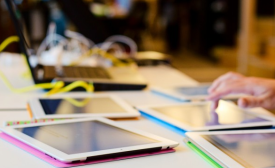public diplomacy

Should public diplomacy policy-makers turn to digital diplomacy tools for the future of practice? I ask this question to provoke some reflection among public diplomacy watchers beyond the quick criticism of tweeting ambassadors and social media campaigns. There seems to be some debate over whether or not digital media practices represent the future of US public diplomacy.
FIFA's executive committee has met in Zurich, Switzerland to discuss whether to move the 2022 World Cup to the winter, so that footballers can avoid playing in Qatar's scorching summer heat. But the scheduling issue was overshadowed by concerns that the migrant workers building the infrastructure in the run-up to the event are being subjected to abusive labour conditions, verging on what one report called "modern-day slavery".
Twenty-five years ago, Ted Turner and Bob Wussler answered an emergency call from the Soviet Union. On the other end were Kim Bohuny and Mike Fratello, pleading from inside a lightless cement bunker, deep behind Soviet lines. They had a simple request. Food. And water.
There have been plenty of bad days in U.S. history. But Oct. 1st should be higher on the list than most people think. On that date in 1999, President Bill Clinton formally abolished the U.S. Information Agency, spinning off its broadcasting element into an independent agency and merging most of the rest into the Department of State. The effort was the product of a curious bipartisan alliance between conservative Sen. Jesse Helms and liberal Secretary of State Madeleine Albright, and its effects were far reaching – shooting U.S. public diplomacy in the back with some six bullets.
On Sept 24, when US President Barack Obama gave his speech in front of the United Nations, he caused a buzz not by what he said, but by what he failed to mention. During his speech, Obama mentioned China once, and the Koreas, Japan, and India zero times, noted most prominently by Ian Bremmer, president of the Eurasia Group.
This funereal op-ed is so fundamentally flawed that it is more like a drive-by shooting. Shooting USIA in the back is an unfortunate metaphor for the context of public diplomacy since many of us who engage in public diplomacy think of it in terms of ballots over bullets and swords into ploughshares. Even those who don’t like this tender-hearted approach view it in the tougher-minded context of political campaign strategies.
So it finally happened. Wow. Last week, as the world speculated whether President Obama and President Hassan Rouhani might encounter one another on the sidelines of the U.N. General Assembly or even exchange a handshake, another, more substantive meeting between Secretary of State Kerry and Iran's Foreign Minister Javad Zarif led to something that hasn't happened since 1979. Iran and America spoke.
“I would like to emphasize once more the great significance of tourism as one of the most important means of public diplomacy that can help create relations and interactions among nations and lead to cultural proximity and mutual understanding of cultures and traditions,” Iran's President Rouhani said while addressing a conference on tourism.







